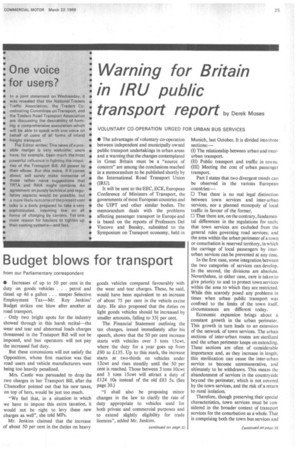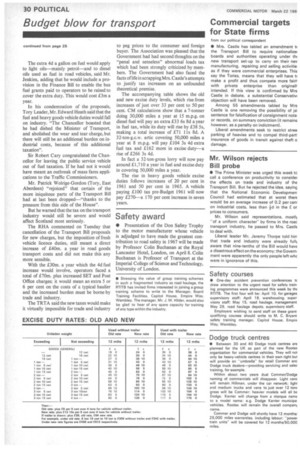Budget blows for transport
Page 27

Page 32

If you've noticed an error in this article please click here to report it so we can fix it.
from our Parliamentary correspondent • Increases of up to 50 per cent in the duty on goods vehicles . . . petrol and diesel up 4d a gallon . . steeper Selective Employment Tax—Mr. Roy Jenkins' Budget strikes one blow after another at road transport.
Only two bright spots for the industry showed through in this harsh recital—the wear and tear and abnormal loads charges threatened in the Transport Bill will not be imposed, and bus operators will not pay the increased fuel duty.
But these concessions will not satisfy the Opposition, whose first reaction was that road users and vehicle manufacturers were being too heavily penalized.
Mrs. Castle was persuaded to drop the two charges in her Transport Bill, after the Chancellor pointed out that his new taxes, on top of hers, would be just too much.
"We feel that, in a situation in which we have to impose this extra taxation, it would not be right to levy these new charges as well", she told MPs.
Mr. Jenkins claimed that the increase of about 50 per cent in the duties on heavy goods vehicles compared favourably with the wear and tear charges. These, he said, would have been equivalent to an increase of about 75 per cent in the vehicle excise duty. He also proposed that the duties on light goods vehicles should be increased by smaller amounts, falling to 331 per cent.
The Financial Statement outlining the tax changes, issued immediately after his speech, shows that the 50 per cent increase starts with vehicles over 3 tons 15cwt, where the duty for a year goes up from £90 to £135. Up to this mark, the increase starts at two-thirds on vehicles under 12cwt and rises steadily until the 50 per cent is reached. Those between 3 tons lOcwt and 3 tons 15cwt will attract a duty of £124 lOs instead of the old £83 5s. (See page 30.) "I shall also be proposing minor changes in the law to clarify the rate of duty appropriate to vehicles used for both private and commercial purposes and to extend slightly eligibility for trade licences", added Mr. Jenkins. The extra 4d a gallon on fuel would apply to light oils—mainly petrol—and to diesel oils used as fuel in road vehicles, said Mr. Jenkins, adding that he would include a provision in the Finance Bill to enable the bus fuel grants paid to operators to be raised to cover the extra duty. This would cost £3m a year.
In his condemnation of the proposals, Tory Leader, Mr. Edward Heath said that the fuel and heavy goods vehicle duties would fall on industry. "The Chancellor boasted that he had dished the Minister of Transport, and abolished the wear and tear charge, but there will still be an additional burden on industrial costs, because of this additional taxation".
Sir Robert Cary congratulated the Chancellor for leaving the public service vehicle Out of fuel taxation. If he had not it would have meant an outbreak of mass fares applications to the Traffic Commissioners.
Mr. Patrick Wolrige-Gordon (Tory, East Aberdeen) "rejoiced" that certain of the more iniquitous parts of the Transport Bill had at last been dropped—"thanks to the pressure from this side of the House".
But he warned that the tax on the transport industry would still be severe and would affect Scotland most seriously.
The RHA commented on Tuesday that cancellation of the Transport Bill proposals for new charges, but the imposition of fresh vehicle licence duties, still meant a direct increase of £40m. a year in road goods transport costs and did not make this any more sensible.
With the £30m. a year which the 4d fuel increase would involve, operators faced a total of £70m. plus increased SET and Post Office charges; it would mean an extra 5 or 6 per cent on the costs of a typical haulier and the increased burden must be borne by trade and industry.
The TRTA said the new taxes would make it virtually impossible for trade and industry to peg prices to the consumer and foreign buyer. The Association was pleased that the Government had had second thoughts on the "penal and senseless" abnormal loads tax which had been strongly criticized by members. The Government had also faced the facts oflife in scrapping Mrs. Castle's attempts to justify tax increases on an unfounded theoretical premise.
The accompanying table shows the old and new excise duty levels, which rise from increases of just over 33 per cent to 50 per cent. CM calculations show that a 7-tanner doing 30,000 miles a year at 15 m.p.g. on diesel fuel will pay an extra £33 6s 8d a year in fuel tax, while its duty will rise by £38 5s, making a total increase of £71 1 is 8d. A 32-ton-g.c.w. artic covering 50,000 miles a year at 8 m.p.g. will pay £104 3s 4d extra fuel tax and £162 more in excise duty—a rise of £266 3s 4d.
In fact a 32-ton-gross lorry will now pay around £1,710 a year in fuel and excise duty in covering 50,000 miles a year.
The rise in heavy goods vehicle excise duties follows increases of 20 per cent in 1961 and 50 per cent in 1965. A vehicle paying £100 tax pre-Budget 1961 will now pay £270—a 170 per cent increase in seven years.












































































































